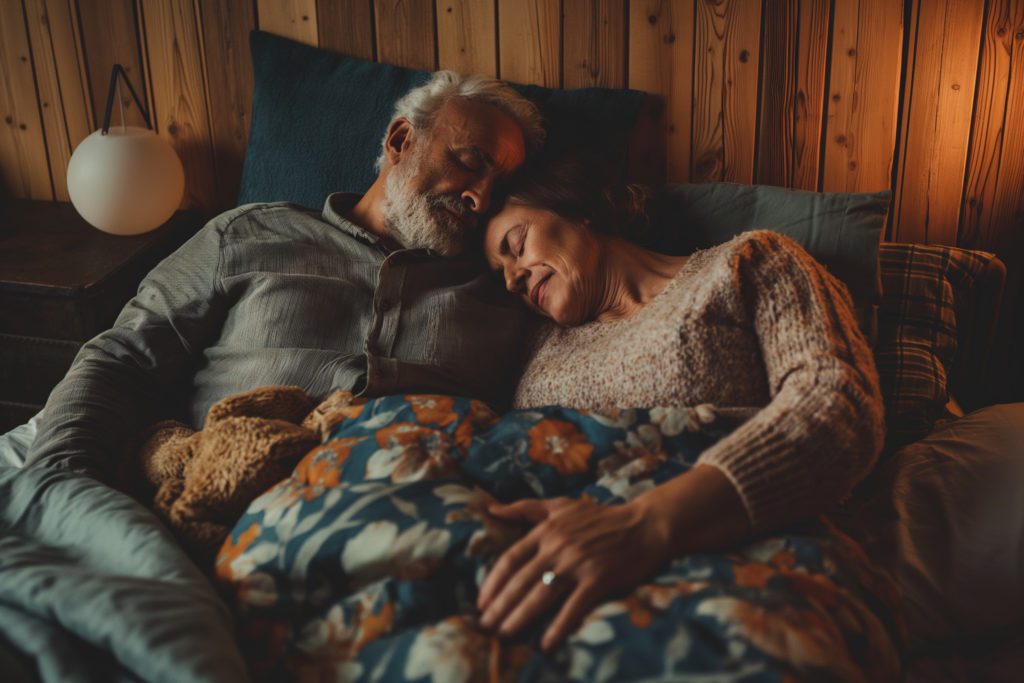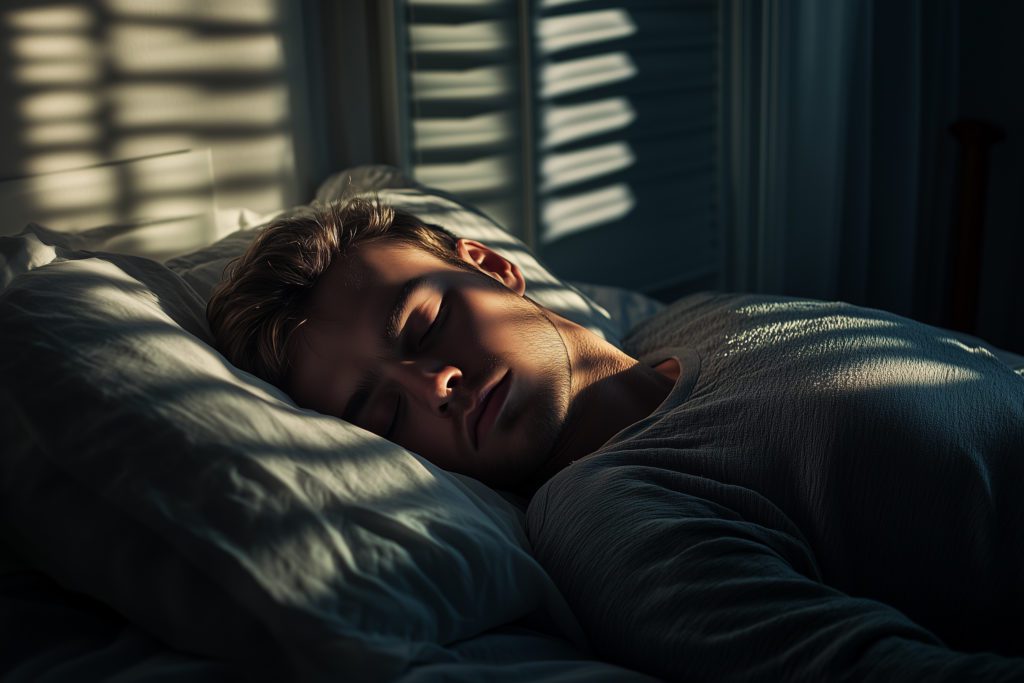
How Depression Affects Your Sleep: Recognizing Signs and Symptoms
Learn how depression and sleep are connected and discover practical tips to improve your sleep quality and overall well-being. Find relief from sleep disturbances and depression.

Depression is a common mental health condition that affects millions of people worldwide. It's a feeling of sadness or hopelessness that can interfere with your daily life. Sometimes, it can feel like a heavy weight on your shoulders, making it difficult to do things you used to enjoy. One of the ways depression can show up is through changes in sleep. This can make it even harder to cope with depression and can create a vicious cycle.
In this article, we'll explore the signs and symptoms of depression and sleep problems and discuss why it's essential to recognize and address these issues early.
Whether you're dealing with depression yourself or know someone who is, recognizing how it impacts sleep can be a key step in managing overall well-being. Let's dive into how depression and sleep impact our health and what we can do to improve them.
Common Reasons for Poor Sleep
There are many reasons why someone might only get poor sleep, like 4 hours or less of sleep a night. Some common causes are:
- Stress and anxiety: When you're feeling stressed or anxious, it can be difficult to relax and fall asleep.
- Work and lifestyle factors: Long working hours, shift work, or a hectic lifestyle can disrupt your sleep schedule.
- Health conditions: Certain medical conditions, such as chronic pain, heart disease, or sleep apnea, can interfere with sleep.
- Substance abuse: Alcohol and drugs can disrupt sleep patterns and make it difficult to get a restful night's sleep.
- Mental health conditions: Depression, Bipolar Disorder, psychosis and other mental health disorders can affect sleep.
- Poor sleep hygiene: Habits like watching TV or using electronic devices in bed can make it harder to fall asleep.
If you're consistently getting only 4 hours of sleep a night, it's important to talk to your healthcare provider to determine the underlying cause and find appropriate treatment.
Understanding the Relationship Between Depression and Sleep
Have you ever noticed how a bad night’s sleep can make the whole world seem a little off the next day? When you're feeling down and depressed, it can be hard to relax and fall asleep. Your mind might be racing with worries and negative thoughts. You might also wake up in the middle of the night and have trouble getting back to sleep.
Getting enough quality sleep is like recharging your batteries. It helps your brain and body recover from the day's activities. When you're well-rested, you're better able to cope with stress, think clearly, and feel more positive.
It's a bit of a catch-22: Depression can make it hard to sleep, and not getting enough sleep can make depression worse. This can create a vicious depression and sleep cycle that can be tough to break.
Signs and Symptoms to Watch For
If you're struggling with depression, you might also notice some changes in your sleep patterns. Here are some signs and symptoms to look out for:
- Difficulty falling asleep (Insomnia): Even when you feel tired, you might have trouble drifting off to sleep or staying asleep. Studies show that around 85% of individuals with major depression also had insomnia.
- Waking up frequently (Restless sleep): You might wake up several times during the night or wake up too early in the morning.
- Excessive sleepiness (Hypersomnia): You might feel excessively sleepy during the day or find yourself sleeping for longer periods of time.
- Feeling unrefreshed: Even after a full night's sleep, you might still feel tired and groggy.
How Poor Sleep Worsens Depression
Getting a poor night's sleep does more than just make you feel groggy—it can actually deepen the feelings of depression. Let’s take a closer look at how missing out on rest affects our mood and health, and why it often leads to a challenging cycle.
When you don’t sleep well, your body misses out on vital processes that help you manage stress and emotions. Without enough sleep, everything from your patience to your ability to think clearly can take a hit. You might find yourself feeling irritable, sad, or just out of sorts. And it’s not just your mood; your physical energy dips, and even your immune system can suffer, making you more susceptible to getting sick.
Here’s where things get really tricky. Poor sleep can make symptoms of depression like sadness, lack of energy, and loss of interest in activities worse. Then, as your mood dips, the stress and anxiety that often accompany depression can make it even harder to get good sleep. It’s a cycle that feeds into itself, each part worsening the other.
Breaking the cycle of depression and sleep can feel daunting, but understanding it is the first step. By tackling sleep problems, you can help ease depression symptoms, and improving your mood can, in turn, lead to better sleep.
Practical Tips for Managing Depression and Sleep Disturbances
If you’re struggling with depression and sleep, you’re not alone. Here are some practical, straightforward tips to help you manage these disturbances and aim for a better night’s sleep:
Establishing a Regular Sleep Routine
What to do: Try to go to bed and wake up at the same time every day, even on weekends. A consistent sleep schedule helps regulate your body's clock and can improve the quality of your sleep. Think of it as setting a rhythm for your body that it can easily follow. To make sure you stay on track with your routine, monitor your sleep using Pillow.
Creating a Comfortable Sleep Environment
How to do it: Make your bedroom a sanctuary for sleep. Pay attention to the lighting—dim lights help signal to your body that it’s time to wind down. Keep the room at a comfortable, cool temperature and reduce noise disruptions where possible.
Limiting Screen Time Before Bed
Why it matters: The blue light emitted by screens on your phone, tablet, or computer can interfere with your ability to fall asleep. Try to turn off these devices at least an hour before bed. Instead of scrolling through social media or sending emails, consider winding down with a book or listening to soothing music.
Relaxation Techniques for Better Sleep
Techniques to try: Deep breathing, meditation, or gentle yoga can help calm your mind and prepare your body for sleep. These practices can reduce stress and create a peaceful transition from wake time to sleep time. Even a few minutes of a relaxation technique before bed can be beneficial.
When to Seek Professional Help
If you're struggling with depression and sleep disturbances, it's important to seek professional help. Here are some signs that it might be time to talk to a healthcare provider:
- Your sleep problems are significantly affecting your daily life.
- You've tried self-care strategies but haven't seen improvement.
- Your depression is getting worse or you're having suicidal thoughts.
A healthcare provider can help you identify the underlying causes of your sleep problems and depression and develop a treatment plan. This may include:
- Therapy: A therapist can help you manage your depression and sleep by developing coping strategies.
- Medication: In some cases, medication may be recommended to help treat depression or address underlying medical conditions that are affecting your sleep.
- Lifestyle Changes: In addition to medical treatments, lifestyle interventions like exercise, nutrition, and stress management might be recommended to help improve your depression and sleep.
Remember, you don't have to go through this alone. Seeking help is a sign of strength, and it can make a big difference in your overall well-being.
FAQ
Can antidepressant medications affect sleep patterns?
Yes, some antidepressants can cause insomnia, vivid dreams, or drowsiness. Selective serotonin reuptake inhibitors (SSRIs) may lead to fragmented sleep, while others, like trazodone, are sedating. If sleep disturbances occur, discussing medication adjustments with a doctor can help.
Is there a connection between oversleeping and depression?
Yes, hypersomnia is a symptom of depression, especially in atypical depression. Excessive sleep can cause grogginess, fatigue, and lower motivation, reinforcing the depressive cycle. If oversleeping is frequent, a doctor can help assess underlying causes.
How does seasonal affective disorder (SAD) impact sleep?
SAD, a form of depression occurring during specific seasons, often leads to longer sleep duration and daytime drowsiness. Changes in light exposure affect melatonin and serotonin levels, disrupting sleep. Light therapy and consistent sleep schedules may help.
Can anxiety co-occurring with depression further disrupt sleep?
Yes, anxiety and depression often coexist, worsening sleep problems. Anxiety causes racing thoughts and hyperarousal, making it difficult to relax. This results in trouble falling or staying asleep, worsening both conditions. Managing both issues together is key.
Does exercise help with sleep and depression?
Yes, regular physical activity can help regulate sleep cycles and boost mood by increasing endorphin and serotonin levels. Moderate aerobic exercise, especially earlier in the day, can improve sleep quality and reduce symptoms of depression and anxiety. However, intense workouts before bed may disrupt sleep.
Can mindfulness and meditation improve sleep in people with depression?
Yes, mindfulness and meditation techniques, such as deep breathing and guided imagery, can reduce stress and promote relaxation, making it easier to fall and stay asleep. These practices may also help manage negative thoughts associated with depression, leading to better mental health overall.

Written by
Emily Mendez
Emily Mendez is a former therapist and mental health author. She is one of the leading voices in mental health. Emily's writing has appeared in eCounseling, SonderMind, and more. Emily is frequently interviewed by Healthline, Fatherly, INSIDER, Family Circle, and other national media for her advice and expert opinion on the latest mental health topics.
Download Pillow
Get help
Press & News
Legal
Connect
X (Twitter)
Company
Copyright © Neybox Digital Ltd.



